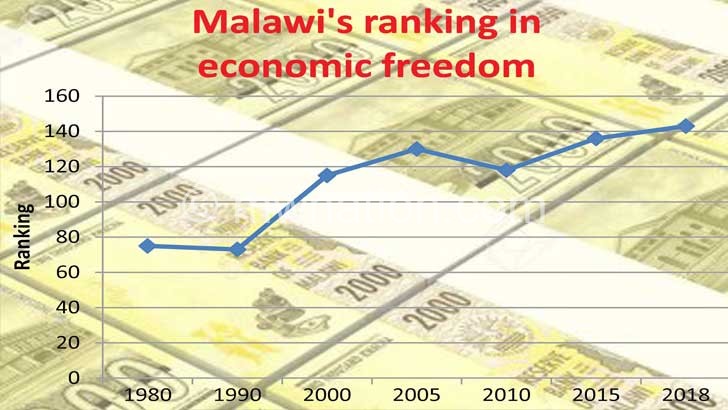MW drops on economic freedom index—report
For the past four decades, economic freedom in Malawi has been declining, a situation analysts attribute to poor implementation of policies and donor dependency.
Figures from the Global Economic Freedom Index 2020 published by the Fraser Institute indicates that the country has moved from position 75 in 1980 to 143 in 2018 out of 162 economies.
The institute bases economic freedom on the concept of self-ownership, observing that because of this self-ownership, individuals have a right to choose—to decide how to use their time and talents to shape their lives.
Economic freedom is the ability among individuals to make their own economic decisions.

The indicators include regulation, freedom to trade internationally, size of government, property rights, government spending and taxation.
Fraser Institute economic freedom chairperson Fred McMahon is quoted in the statement as having said that people living in countries with high levels of economic freedom enjoy greater prosperity, more political and civil liberties and longer lives.
“Where people are free to pursue their own opportunities and make their own choices, they lead more prosperous, happier and healthier lives,” he said.
On his part, Lucius Cassim, who teaches economics at Chancellor College—a constituent college of the University of Malawi (Unima), said in an interview yesterday that despite Malawi having good policies, implementation, coupled with an over-reliance on donors has not helped matters.
He said: “Without downplaying the role that development partners have on our economy let alone the budget, we have created an environment where we tend to rely too much on them.
“So, basically, much as we are to blame for poor implementation of fairly good policies, the donors are also to blame for not creating an environment where we can thrive on our own.”
Betchani Tchereni, associate professor of economics at The Polytechnic—a constituent college of the Unima said: “It is really important for government to make sure that our people are free, developing and moving out of poverty.”
When contacted Ministry of Economic Planning and Development Principal Secretary Winford Masanjala said he will comment once they have reviewed the report. Despite implementing successive development plans since 1962, Malawi has nothing to show for them as the country is still one of the poorest in the world with a gross national income per capita of $380 (K281 200).
Since 1962, Malawi has had over 11 development plans whose main goal was to grow the economy at an average of six percent.
The plans include Nyasaland Development Plan (1962-65), Malawi Development Plan (1965-1969), Statement of Development Policies (Devpol I, 1971-1980), Devpol II (1987-1996), Poverty Alleviation Programme/Policy Framework Papers (1995-2000), Vision 2020 (1998-2020), Malawi Poverty Reduction Strategy Paper (2002-2005), Malawi Economic Growth Strategy (2006-2011), Economic Recovery Plan (2012-2014) and MGDS I, II and III.





